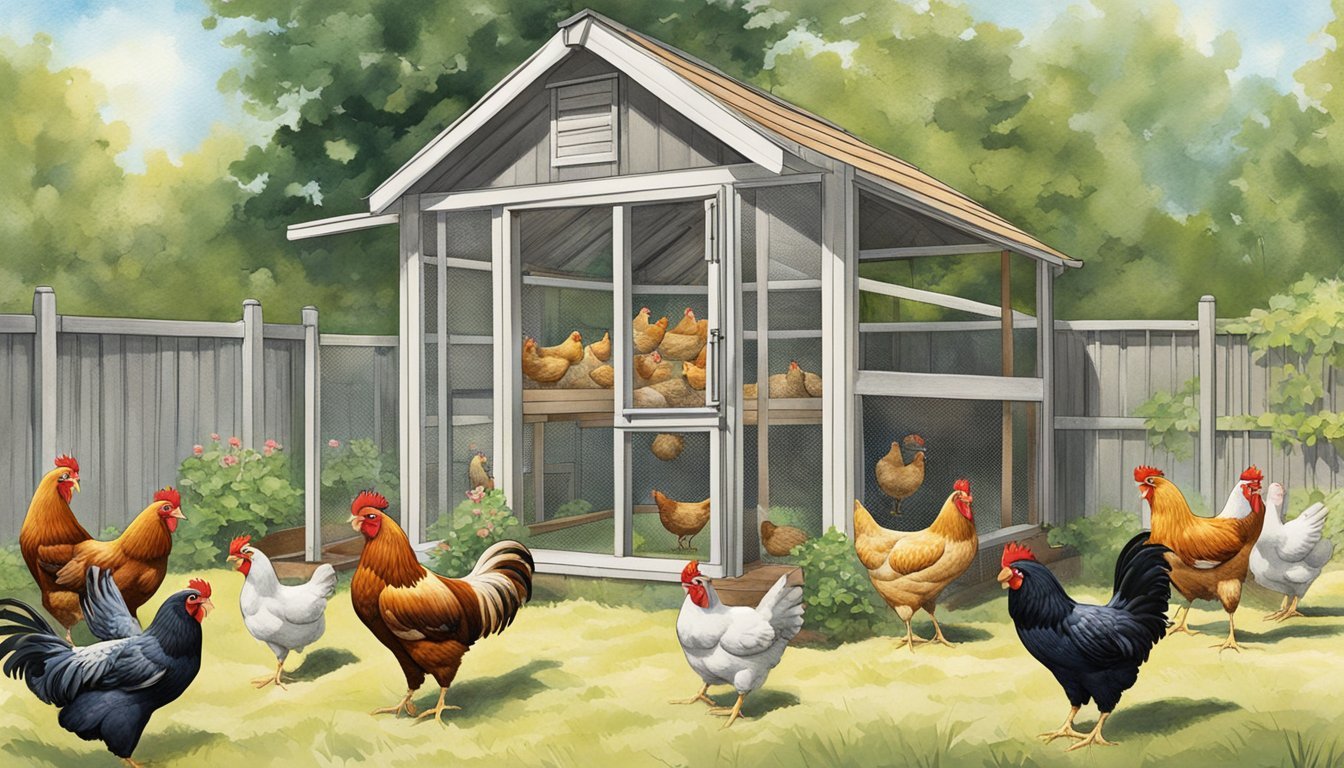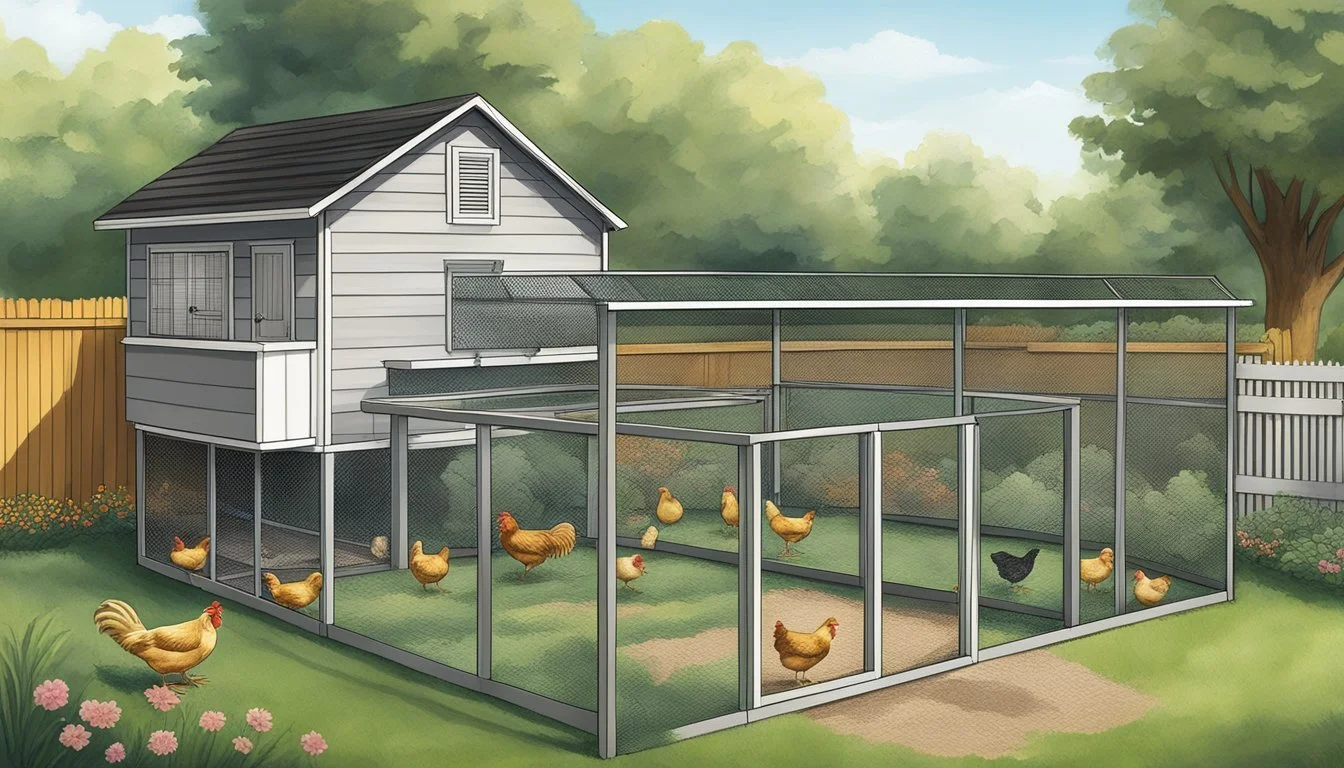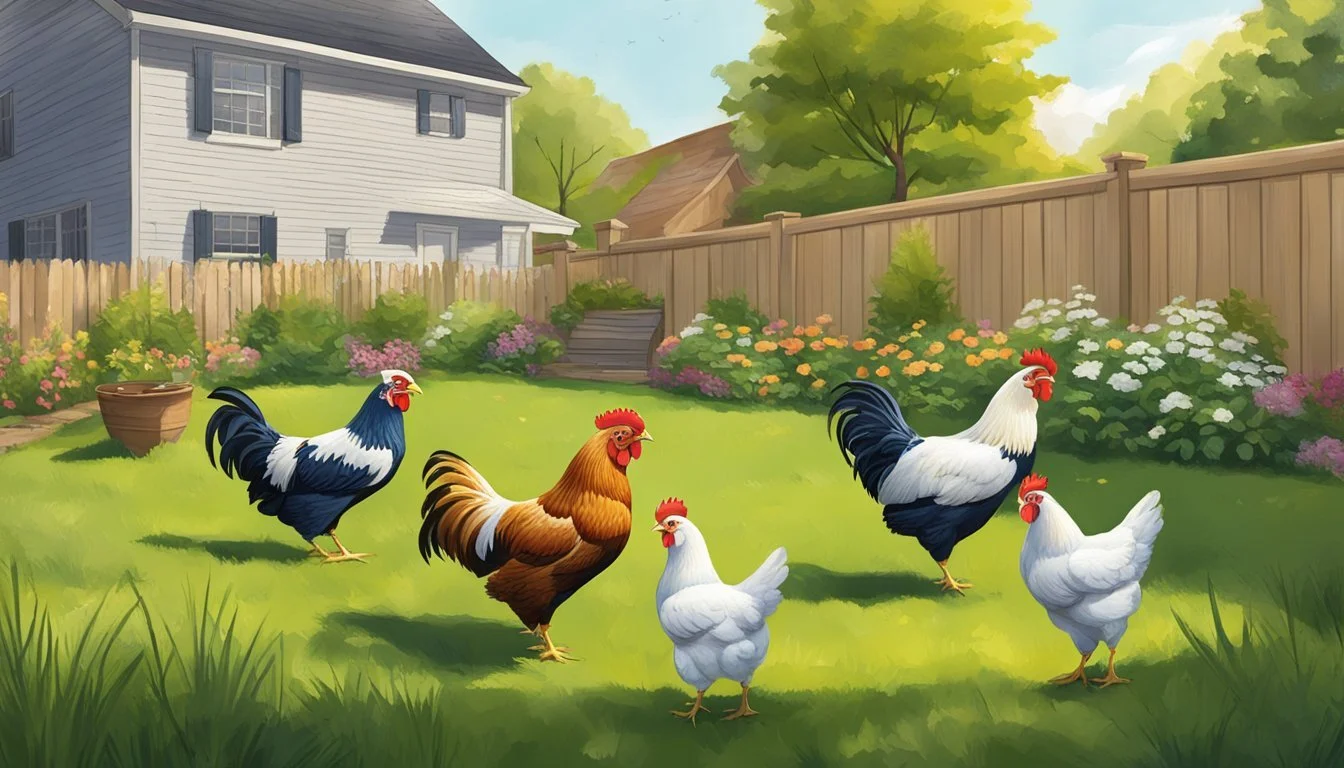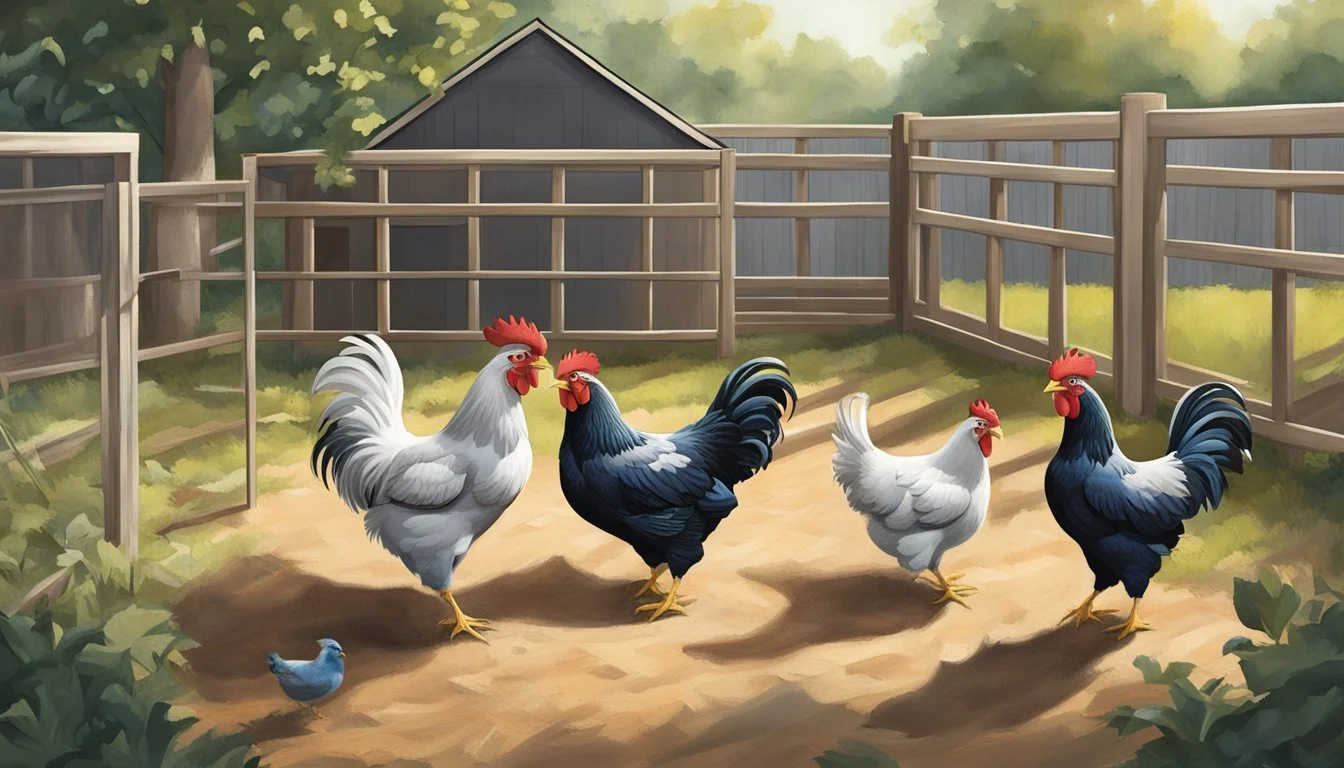Raising Backyard Chickens in Waukegan, IL
A Beginner's Guide to Urban Poultry Farming
Raising backyard chickens has become an increasingly popular endeavor for many residents seeking a more sustainable lifestyle, fresh eggs, and the joys of poultry husbandry. In Illinois, the trend reflects a growing interest in urban and suburban agriculture, with local ordinances shaping how residents can engage in this practice. The specifics of what is permissible, however, vary considerably from city to city, with differing regulations on the number of chickens, the inclusion of roosters, coop constraints, and permit requirements.
In Waukegan, Illinois, individuals interested in raising backyard chickens face a significant restriction. The city code of Waukegan does not currently allow the keeping of backyard chickens, marking a contrast against other Illinois municipalities where limited chicken husbandry is possible. As a result, residents of Waukegan looking to join the movement towards local food production must navigate this local ordinance which stands as a barrier to raising chickens at home.
While the laws in Waukegan are restrictive, the discourse among residents shows a community of interest pushing towards legalizing backyard chickens. Dialogue in public forums such as city council meetings suggests that a portion of the populace is advocating for change. These discussions highlight the importance of staying informed about local government decisions and being involved in community dialogues to understand the ongoing evolution of ordinances that impact backyard chicken raising in Waukegan, Illinois.
Understanding Local Ordinances
Local ordinances governing the raising of backyard chickens vary by municipality in Illinois, and in Waukegan specific rules are in place. Compliance with these can affect the feasibility and legality of one’s chicken-raising endeavors.
Navigating Waukegan Chicken Ordinances
Waukegan's city ordinances are definitive on the subject of backyard chickens; they are not allowed within the city limits. Individuals interested in keeping chickens must refer to Ordinance No. 23-O-294, enacted October 2, 2023, for the most current regulations. Updates and changes can occur, so consulting with Waukegan’s local government is advisable for the latest information.
Illinois State Regulations
While there are no statewide regulations that universally allow or prohibit the keeping of backyard chickens in Illinois, individual municipalities set their own regulations. Waukegan residents must adhere to local rather than state ordinances when considering raising chickens.
Number of Chickens Allowed
Waukegan does not permit the keeping of backyard chickens, therefore there is no stipulated number that residents are allowed to keep. For those in regions where chickens are allowed, the number can vary based on zoning laws and lot size, and one should consult their local ordinances for specifics.
Zoning Laws and Property Requirements
Zoning laws dictate the use of land for specific purposes within different areas of a municipality. Property requirements and regulations about the raising of chickens, including coop placement, distance from neighboring dwellings, and sanitation, typically fall under these local zoning laws. Residents must check with Waukegan's local zoning department to understand the limitations and requirements if any changes to the current ban occur.
Planning and Building Your Chicken Coop
When raising backyard chickens in Waukegan, IL, a well-planned and built coop is essential to protect your flock from harsh weather and predators while providing comfort.
Choosing the Right Location
Selecting an appropriate location for the chicken coop is crucial. It should be on high ground with good drainage to prevent water accumulation. Ample sunlight is important for the chickens' health and for keeping the coop dry, yet it should also have some shaded areas to protect chickens from excessive heat during hotter months.
Size and Security Requirements
The size of your chicken coop will depend on the number of chickens you plan to raise. As a rule of thumb, allocate about 2-3 square feet per chicken inside the coop and 8-10 square feet per chicken in an outside run. Security is paramount; ensure the coop and run are fortified against predators with sturdy fencing and consider installing automatic coop doors that shut at nightfall.
Coop Design and Materials
The design of the chicken coops should facilitate easy cleaning and maintenance. Use durable materials that can withstand Waukegan's weather, like treated wood for the frame and heavy-duty hardware cloth for windows. A pitched roof promotes rain runoff, and using metal roofing provides longevity.
Essential Coop Features
Ventilation: Proper ventilation is necessary to remove moisture and ammonia, keeping the air fresh. Install vents or windows that can be opened or closed as needed.
Coop Heating: Winters in Waukegan, IL can be cold; coop heating may be required. Ceramic heat emitters can be a safe heat source.
Coop Lighting: Chickens need light for laying eggs. Energy-efficient LED lights on a timer can provide consistent light during short winter days.
Security: A sturdy lock on the door and mesh wire beneath the soil's surface around the coop will deter digging predators.
Selecting Your Chickens
When raising backyard chickens in Waukegan, IL, it is crucial to select the appropriate breeds, understand local rooster regulations, and grasp the essentials of chick care. The recommended flock size and dynamics play a significant role in the overall health and productivity of the chickens.
Deciding on Chicken Breeds
When choosing chicken breeds, potential owners should consider factors such as climate adaptability, temperament, and egg production. While the climate in Waukegan is conducive to a variety of breeds, cold-tolerant breeds like the Plymouth Rock or the Rhode Island Red are often recommended for their hardiness. Additionally, breeds like the Sussex or Orpington are known for their docile nature, making them suitable for backyard settings.
Understanding Rooster Regulations
Waukegan may have specific regulations regarding the keeping of roosters due to noise considerations. It is essential to check local ordinances before adding a rooster to a backyard flock. Many urban settings allow hens but prohibit or limit the number of roosters due to their crowing, which can be a nuisance to neighbors.
Chick Care and Starter Tips
New owners should begin with 18-20% starter feed crumbles for chicks aged 0-8 weeks and transition to a 16-18% starter/grower feed as they reach 8-14 weeks. This nutritional foundation is vital for early development. Additionally, adequate heat sources and safe bedding material such as pine shavings or straw must be provided for the comfort and health of the chicks.
Flock Size and Dynamics
The flock size should be determined by the available space and the capacity to maintain a clean, sustainable environment. A good rule of thumb is to provide 2-3 square feet of coop space per chicken. Overcrowding can lead to stress, pecking, and the spread of disease. Introducing new chickens to an existing flock should be done cautiously to maintain flock dynamics and minimize aggression.
Feeding and Nutrition
Proper nutrition is crucial for the health and productivity of backyard chickens. A balanced diet ensures optimal growth, egg production, and longevity.
Feeding Your Flock
One should introduce feeders that minimize waste to effectively feed chickens. Feeders should be regularly cleaned to prevent the spread of disease and should be designed to prevent chickens from scattering food. Chickens typically eat whenever they feel the need, so it is important that feeders are kept filled with the appropriate food suitable for the chicken's stage of life.
Types of Chicken Feed
Starter Feed: High in protein, this feed is for chicks up to 8 weeks old.
Grower Feed: With slightly less protein, suitable for chickens from 8 to 20 weeks old.
Layer Feed: For laying hens, it includes calcium for shell development.
Feed should include essential amino acids such as methionine and lysine, and vitamins like A, D3, B12, E, as well as minerals like copper sulfate and phosphorus. It's vital to offer a varied diet that reflects a chicken’s nutritional needs at various life stages.
Providing Fresh Water
Chickens need continuous access to fresh water. Waterers should prevent spillage and be checked daily to ensure they are clean and filled. In proper chicken care, preventing the water from freezing during the colder months is as important as keeping it cool and refreshed during hot summer days.
Health and Wellness
Raising backyard chickens in Waukegan, IL, demands attentiveness to health and wellness to ensure the birds live productive, disease-free lives, which in return provides healthy eggs. Adequate care, disease prevention, and proper management of temperature and parasites are crucial.
Preventing and Identifying Illness
Regular health checks are critical in preventing and identifying illness in backyard chickens. Owners should look for signs of distress, changes in eating or laying patterns, and abnormal discharges or swellings. Common illnesses include respiratory infections and reproductive diseases. Early detection and treatment often result in better outcomes for the affected chickens.
Parasite and Pest Control
Chickens can be affected by various parasites like mites, lice, and internal worms. A proactive approach involves:
Regular inspections of feathers and skin for external parasites.
Maintaining cleanliness in the coop to prevent infestations.
Deworming periodically as a preventive measure.
Keeping the coop and run clean reduces the risk of pests and parasites significantly.
Temperature Management
Proper temperature control is crucial, especially for young chicks that cannot regulate their body temperatures. Heat lamps or warming plates can maintain optimal temperatures in the brooder. For adult chickens:
Summer: Ensure adequate shade and ventilation to prevent overheating.
Winter: Provide insulated shelter, while avoiding overheating with too much artificial heat.
By addressing these areas diligently, owners can maintain their chickens' health and wellness, enabling a thriving backyard flock in Waukegan, IL.
Egg Collection and Handling
Raising backyard chickens for egg production requires attention to detail and an understanding of proper handling techniques. The points to keep in mind are the construction and maintenance of nesting boxes, the safe collection and storage of eggs, and the patterns of egg production.
Setting Up Nesting Boxes
To ensure hens have a secure place to lay their eggs, each nesting box should measure approximately 12x12x12 inches and contain soft bedding, such as straw or wood shavings. These boxes should be positioned in quiet, secluded areas of the coop to encourage laying and should be kept clean to protect the eggs from contamination.
Box dimensions: 12"x12"x12"
Material for bedding: Straw or wood shavings
Location: Secluded and quiet areas
Gathering and Storing Eggs
Collect eggs daily to ensure freshness and to prevent breakage or becoming dirty. When it's necessary to clean eggs, use warm water as cold water can cause the egg to contract and potentially draw bacteria into the porous shell. After washing, let eggs air-dry thoroughly before storage. For best quality, eggs should be stored at a consistent, cool temperature and used within a reasonable time frame.
Frequency: Daily collection
Cleaning: Warm water, air-dry thoroughly
Storage temperature: Consistent and cool
Understanding Egg Production
The production of eggs in backyard chickens can vary, with flocks typically laying for three to four years. Each year, egg production tends to decrease while the size of the eggs increase, and the shell quality may diminish. Egg production is influenced by the amount of daylight, with hens requiring 12 to 14 hours to maintain consistent laying patterns.
Laying span: 3-4 years
Annual changes: Decrease in quantity, increase in size
Daylight: 12 to 14 hours required for consistent laying
Waste Management and Composting
Integrating chickens into a backyard setting in Waukegan, IL not only provides the benefits of fresh eggs and natural pest control but also introduces an opportunity for efficient waste management through composting.
Handling Chicken Waste
When managing chicken waste, it's crucial to consider both the environmental and practical aspects of the process. Chicken manure, rich in nitrogen, can be composted to create a potent fertilizer beneficial for gardens. However, it must be handled correctly to prevent the accumulation of harmful pathogens or unpleasant odors.
The compost bin or barrel is a common method for managing chicken waste. Here's a step-by-step approach to ensure that the compost is safe and productive for garden use:
Collect the waste: Manure and bedding should be removed from the coop regularly to maintain a healthy environment for the chickens.
Begin the compost pile: Combine the manure with equal parts of carbon-rich material such as leaves, straw, or sawdust to balance the high nitrogen content of the waste.
Maintain moisture Levels: A compost pile needs to be moist but not waterlogged. Aiming for the consistency of a wrung-out sponge is a good rule of thumb.
Regular Aeration: Turning the compost pile periodically introduces oxygen, which is essential for the breakdown process and to control odors.
Monitor Temperature: A properly managed compost pile will heat up, which is necessary to break down the waste material and destroy pathogens.
Once the composting process is complete, the outcome is a nutrient-rich, composted material that can improve soil structure and benefit plant growth, turning waste into a valuable resource for the backyard gardener. It's essential for residents of Waukegan, IL, to stay informed about local regulations regarding chicken keeping and waste management to ensure compliance with municipal guidelines.
Social Aspects of Raising Chickens
In Waukegan, IL, backyard chickens are often more than just pets or sources of food; they play a role in fostering social interactions and community involvement.
Interacting with Neighbors
Raising chickens in an urban environment like Waukegan inevitably brings neighbors into the conversation. It requires the chicken owner to communicate effectively to ensure that their hobby does not negatively impact those living around them. Concerns may range from noise to odors, and addressing these proactively is key to maintaining good relations. For example:
Noise Management: Hens tend to be quieter than roosters, which is relevant in densely populated areas.
Odor Control: Regular coop cleaning minimizes smells, a courtesy for neighboring residents.
Chicken owners often find that their feathery companions spark curiosity and fascination among their neighbors, especially if they are not familiar with the ins and outs of chicken care. This can lead to educational opportunities and the sharing of resources about sustainable living practices.
Community Engagement and Resources
Raising chickens can extend beyond the bounds of one's yard to involve broader community interaction and resource sharing. Chicken enthusiasts in Waukegan might engage with local online communities, such as Facebook groups or other social media platforms, where they can share tips, seek advice, and exchange supplies. Here, new chicken owners can learn from more experienced members about best practices for coop construction, proper feeding, and general chicken health. Moreover, urban chicken keepers provide each other emotional support and companionship through shared experiences, creating a tight-knit social network.
Community Resources: Tables or lists of local feed stores, chicken care workshops, and coop construction services.
Social Media: Virtual hubs for sharing experiences, arranging coop tours, and facilitating discussion.
These interactive engagements enrich the urban chicken-raising experience, fostering a sense of unity among poultry enthusiasts and contributing to a more informed, connected urban farming community.
Advanced Chicken Care
Raising backyard chickens requires attention to detail, and advanced chicken care is about optimizing the well-being and productivity of your flock. It covers breeding and incubation, advanced feeding techniques, and ways to improve the chickens' enrichment and lifestyle.
Breeding and Incubation
Breeding chickens in Waukegan requires understanding the complexities of egg production and genetic traits. Selective breeding can improve not only the appearance and health of chickens but also enhance egg-laying capabilities. A reliable incubator with controlled humidity and temperature is crucial for hatching success. Coop cameras can be installed to closely monitor breeding behavior and egg incubation without causing undue stress to the birds.
Advanced Feeding Techniques
Advanced feeding techniques are instrumental in promoting the health and growth rate of backyard chickens. This entails investing in feeders that minimize waste and prevent contamination.
Feeders: Use anti-waste feeders with adjustable openings.
Waterers: They should be clean and designed to prevent drowning.
In addition, incorporating a diet with the correct balance of protein, carbohydrates, and essential minerals contributes significantly to the overall vitality and productivity of the flock.
Enrichment and Lifestyle
Chickens thrive in environments that cater to their natural behaviors. Providing enrichment through perches and toys can significantly improve their quality of life.
Bedding: Use a deep layer of 6 to 12-inch dry bedding to provide insulation and comfort.
Perches: Offer various heights and textures for roosting.
Toys: Simple objects like mirrors or strings of beads can keep chickens entertained.
Moreover, regular use of coop deodorizers can maintain a clean and odor-free environment while anti-pecking spray helps prevent injurious behaviors amongst the flock. Advanced care also involves using tools like chicken pluckers to efficiently process birds for meat and bedding to ensure a clean living area, ultimately contributing to the chickens' overall health and happiness.











